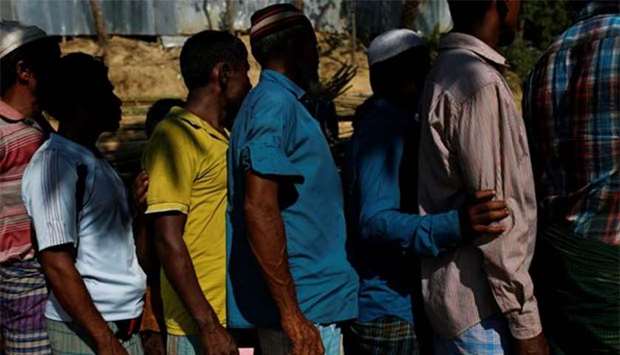At least 6,700 Rohingya Muslims were killed in the first month of a Myanmar army crackdown in Rakhine state that began in late August, Doctors Without Borders (MSF) said on Thursday.
The figure is the highest estimated death toll yet of violence that erupted on August 25 and triggered a massive refugee crisis, with more than 620,000 Rohingya fleeing Myanmar for Bangladesh over a three-month period.The UN and US have described the military operation as "ethnic cleansing" of the Muslim minority, but have not released specific death tolls.
"At least 6,700 Rohingya, in the most conservative estimations, are estimated to have been killed, including at least 730 children below the age of five," MSF said on Thursday.
The group's findings come from six surveys of more than 11,426 people in Rohingya refugee camps and cover the first month after the crisis erupted.
"We met and spoke with survivors of violence in Myanmar, who are now sheltering in overcrowded and unsanitary camps in Bangladesh," said the group's medical director Sidney Wong.
"What we uncovered was staggering, both in terms of the numbers of people who reported a family member died as a result of violence, and the horrific ways in which they said they were killed or severely injured."
Rohingya refugees have told consistent stories of security forces and ethnic Rakhine Buddhist mobs driving them out of their homes with bullets, rape and arson that reduced hundreds of villages to ash.
Earlier this month the United Nations High Commissioner for Human Rights Zeid Ra'ad Al Hussein said the military-led crackdown appeared to include "elements of genocide".
The MSF survey puts a number to the horrors.
Gunshot wounds were the cause of death in 69% of the cases, according to the survey.
Another 9% were reported burned alive inside houses, while 5% died from fatal beatings.
For children under five, nearly 60% died after being shot, the survey found.
MSF said the peak in deaths coincided with the launch of "clearance operations" by the army and local militias in late August, and showed "that Rohingya have been targeted".
Myanmar's government did not respond to a request for comment.
But it has consistently denied abuses in Rakhine and puts the official death toll at 400 people -- including 376 Rohingya "terrorists", according to the army.
Authorities have also blocked a UN fact-finding mission from accessing the conflict zone in northern Rakhine state.
The investigators visited refugee camps in Bangladesh in late October and said -- based on interviews -- that the total number of deaths was not known but "may turn out to be extremely high."
The Rohingya are not recognised as an ethnic group in mainly Buddhist Myanmar and have been subject to systematic persecution for decades.
Bangladesh and Myanmar signed a repatriation agreement in late November saying that Rohingya refugees could start to return home in two months, but international aid groups have threatened to boycott working with the government if new camps are set up in northern Rakhine State.
More than 120,000 Rohingya already live in closed-off settlements in the central part of the state since intercommunal violence erupted in 2012.

